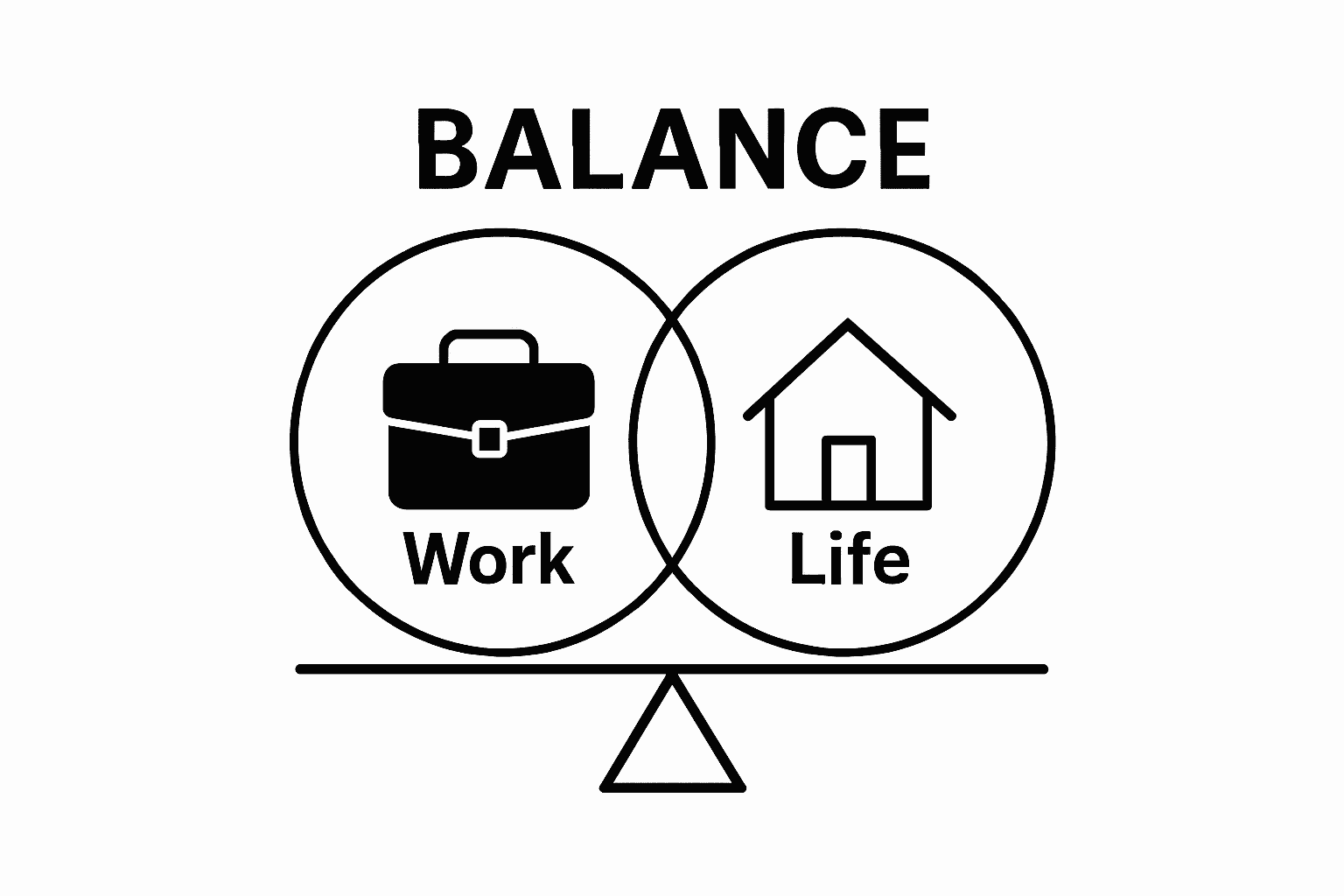Work life balance shapes how we split our energy between career and personal time. Most people expect this juggling act to demand endless sacrifice. Yet research shows that people who achieve healthier work life balance report up to 21 percent more life satisfaction and far better mental health. That means finding the right rhythm may actually help you perform better at work and enjoy your downtime without guilt.
Table of Contents
- What Is Work Life Balance And Why It Matters
- The Impact Of Poor Work Life Balance On Mental Health
- Understanding The Key Concepts Of Work Life Balance
- Natural Solutions For Enhancing Work Life Balance
- The Role Of Mindfulness And Awareness In Work Life Balance
Quick Summary
| Takeaway | Explanation |
|---|---|
| Establish clear work-life boundaries. | Define specific times for work and personal life to protect each domain. |
| Mindfulness enhances work-life balance. | Practice mindfulness to manage stress and create a more harmonious life experience. |
| Recognize signs of burnout early. | Identifying early symptoms of burnout helps prevent physical and mental health issues. |
| Invest in personal relationships. | Nurturing friendships and family connections is vital for overall life satisfaction. |
| Regularly assess work-life balance. | Continuous reflection allows for adjustments in life strategies to maintain balance. |
What Is Work Life Balance and Why It Matters
Work life balance represents the strategic allocation of time and energy between professional responsibilities and personal life, ensuring neither domain overwhelms the other. At its core, this concept recognizes that humans are multifaceted beings with complex needs extending beyond workplace productivity.
Defining Work Life Balance
Work life balance is not about achieving a perfect 50/50 split between work and personal time, but rather creating a sustainable harmony where professional achievements do not come at the expense of personal well-being. According to research from the National Institutes of Health, this balance is critical for mental and physical health, directly impacting an individual’s overall quality of life.
Key elements of work life balance include:
- Establishing clear boundaries between work and personal time
- Maintaining physical and mental health
- Preserving personal relationships and social connections
- Preventing professional burnout
- Promoting overall life satisfaction
The Critical Importance of Balance
When work life balance is disrupted, individuals experience significant negative consequences. Chronic work stress can lead to a cascade of health problems, including:
- Increased risk of anxiety and depression
- Compromised immune system functionality
- Higher likelihood of cardiovascular diseases
- Decreased cognitive performance
- Strained personal relationships
Modern work environments, characterized by constant connectivity and blurred boundaries between professional and personal spaces, make achieving work life balance more challenging yet simultaneously more essential. Technology enables unprecedented workplace flexibility but also creates expectations of constant availability, requiring individuals to be intentional about managing their time and energy.
Ultimately, work life balance is not a luxury but a fundamental requirement for sustainable personal and professional success. By prioritizing this equilibrium, individuals can cultivate resilience, maintain motivation, and create a more fulfilling life experience that honors both their career aspirations and personal well-being.
The Impact of Poor Work Life Balance on Mental Health
Poor work life balance represents a significant threat to mental health, creating a complex web of psychological and physiological challenges that can undermine personal well-being and professional performance. Understanding these impacts is crucial for developing effective strategies to protect mental wellness in an increasingly demanding work environment.
Psychological Consequences of Imbalance
Research from the National Institutes of Health reveals that chronic work life imbalance triggers a cascade of psychological distress. When professional demands consistently encroach upon personal time and space, individuals experience heightened levels of stress, anxiety, and emotional exhaustion.
Key psychological impacts include:
- Persistent feelings of overwhelm and inadequacy
- Reduced emotional resilience
- Increased susceptibility to depressive symptoms
- Diminished sense of personal control
- Erosion of self-identity beyond professional roles
Neurological and Physiological Stress Responses
Continuous work life imbalance doesn’t just affect mental states but fundamentally alters neurological functioning. Prolonged exposure to work-related stress activates the body’s sympathetic nervous system, triggering chronic cortisol production that can lead to significant neurological changes.
Physiological manifestations of this stress include:
- Disrupted sleep patterns
- Compromised immune system functioning
- Increased inflammation markers
- Accelerated cellular aging
- Potential long-term neuroplastic changes in brain structure
The interconnection between mental and physical health becomes starkly evident when work life balance is consistently neglected. What begins as workplace stress can transform into a comprehensive health challenge that impacts every aspect of an individual’s life.
Below is a table summarizing the psychological and physiological impacts of poor work life balance as detailed in the article.
| Impact Type | Description |
|---|---|
| Psychological Distress | Persistent feelings of overwhelm, increased anxiety, and reduced emotional resilience |
| Emotional Exhaustion | Diminished sense of control, increased susceptibility to depressive symptoms |
| Reduced Self-Identity | Erosion of personal identity beyond professional roles |
| Disrupted Sleep Patterns | Chronic work stress leading to poor sleep and increased fatigue |
| Immune System Compromise | Prolonged stress associated with compromised immune system functioning |
| Increased Inflammation | Elevated stress hormones contribute to higher inflammation markers |
| Accelerated Cellular Aging | Chronic stress leading to faster cellular aging and potential neuroplastic changes |
Recognizing these profound implications underscores the importance of proactive management strategies. Mental health is not a passive state but an active process requiring deliberate boundaries, self-awareness, and a commitment to holistic well-being. By understanding the intricate relationship between work demands and psychological health, individuals can develop more resilient approaches to managing professional and personal responsibilities.
Understanding the Key Concepts of Work Life Balance
Work life balance represents a nuanced framework of personal management that goes beyond simple time allocation, encompassing psychological, emotional, and practical strategies for maintaining holistic well-being. Understanding its core concepts provides individuals with powerful tools for navigating complex modern work environments.
Fundamental Components of Balance
Research from the International Journal of Environmental Research and Public Health reveals that work life balance is composed of interconnected elements that require deliberate attention and strategic management. These components are not static but dynamic processes that adapt to changing personal and professional circumstances.
The following table breaks down the fundamental components of work life balance discussed earlier in the article for easier reference.
| Component | Description |
|---|---|
| Boundary Establishment | Clear separation between work and personal life domains |
| Psychological Separation | Mental distinction and transition between work and personal roles |
| Intentional Time Management | Strategic control and planning of time for balanced priorities |
| Emotional Resilience | Ability to handle stress and adapt to changing circumstances |
| Flexible Adaptation | Adjusting strategies and routines to meet evolving life and work demands |

Key foundational components include:
- Boundary establishment between professional and personal domains
- Psychological separation of work and personal roles
- Intentional time management strategies
- Emotional resilience and stress regulation
- Flexible adaptation to changing life circumstances
Role Conflict and Psychological Boundaries
Role conflict emerges when expectations from professional and personal spheres create competing demands. Psychological boundaries serve as essential mechanisms for managing these potential conflicts, allowing individuals to mentally transition between different life domains without experiencing overwhelming stress.
Critical aspects of psychological boundary management involve:
- Developing clear mental demarcations between work and personal identities
- Creating ritualistic transition practices between professional and personal spaces
- Practicing mindful detachment from work-related stressors during personal time
- Cultivating self-awareness about emotional spillover between roles
- Implementing deliberate mental reset techniques
Effective work life balance is not about achieving perfect equilibrium but developing adaptive strategies that allow for meaningful engagement across different life domains. By understanding these intricate concepts, individuals can create personalized approaches that honor both professional aspirations and personal well-being, transforming balance from an abstract concept into a practical, lived experience.
Natural Solutions for Enhancing Work Life Balance
Natural solutions for improving work life balance focus on holistic approaches that integrate psychological, physiological, and lifestyle strategies. These methods prioritize sustainable well-being through intentional practices that support mental clarity, emotional resilience, and personal harmony.
Mindfulness and Stress Reduction Techniques
Research from the Maryland University of Integrative Health highlights the transformative power of mindfulness in managing work life balance. By cultivating present-moment awareness, individuals can develop more effective stress management skills and create meaningful boundaries between professional and personal domains.
Key mindfulness practices include:
- Daily meditation and breathing exercises
- Guided visualization techniques
- Journaling for emotional processing
- Body scan and progressive relaxation methods
- Mindful movement practices like yoga
Creating Supportive Lifestyle Rhythms
Establishing natural rhythms and supportive lifestyle patterns becomes crucial in maintaining work life balance. This involves creating intentional structures that support mental and physical well-being while allowing flexibility for personal growth. Learn more about enhancing focus and well-being through holistic practices.
Essential lifestyle strategies encompass:
- Consistent sleep schedules
- Regular physical activity
- Nutrition that supports cognitive function
- Dedicated personal development time
- Purposeful disconnection from digital devices
Natural solutions for work life balance recognize that well-being is not about rigid control but about creating adaptive, compassionate approaches to managing life’s complex demands. By integrating mindful practices, individuals can cultivate a more harmonious relationship with work, ultimately supporting their overall mental health and personal satisfaction.
This table provides a concise overview of mindfulness and lifestyle-based solutions for enhancing work life balance as described in the article.
| Approach Category | Key Examples and Practices |
|---|---|
| Mindfulness Practices | Meditation, breathing exercises, guided visualization, journaling, yoga |
| Supportive Lifestyle Rhythms | Consistent sleep schedules, regular physical activity, balanced nutrition |
| Personal Development | Intentional time for growth and skill building |
| Digital Detox | Purposeful disconnection from digital devices |

The Role of Mindfulness and Awareness in Work Life Balance
Mindfulness represents a transformative approach to managing work life balance, offering individuals a powerful method for navigating professional challenges while maintaining personal well-being. By cultivating present-moment awareness, people can develop more intentional and responsive strategies for managing complex life demands.
Understanding Mindful Awareness
Research from the International Journal of Environmental Research and Public Health reveals that mindfulness goes beyond simple stress reduction, functioning as a comprehensive psychological framework for self-regulation and emotional intelligence. This practice enables individuals to observe their thoughts and experiences without judgment, creating a critical mental space between stimulus and response.
Key components of mindful awareness include:
- Non-judgmental observation of internal experiences
- Intentional present-moment focus
- Emotional self-regulation
- Enhanced cognitive flexibility
- Reduced reactivity to work-related stressors
Neurological Mechanisms of Mindfulness
Mindfulness fundamentally alters neurological processing, creating measurable changes in brain structure and function. Through consistent practice, individuals can rewire neural pathways, enhancing their capacity to manage stress and maintain emotional equilibrium. Explore how holistic practices can enhance focus and well-being.
Significant neurological benefits of mindful awareness encompass:
- Reduced activation of stress response systems
- Increased prefrontal cortex engagement
- Enhanced emotional processing capabilities
- Improved attentional control
- Greater capacity for complex problem solving
By integrating mindfulness into daily life, individuals transform work life balance from an external management challenge to an internal practice of conscious engagement. This approach recognizes that true balance emerges not from rigid compartmentalization but from a fluid, aware, and compassionate relationship with one’s professional and personal experiences.
The table below summarizes the key neurological and psychological benefits of mindfulness practices highlighted in the article.
| Benefit Category | Specific Effects |
|---|---|
| Stress Response Reduction | Reduced activation of stress systems, lower cortisol levels |
| Cognitive Function | Enhanced attentional control, improved problem-solving |
| Emotional Processing | Better emotional regulation, reduced reactivity to work stress |
| Neurological Adaptation | Increased prefrontal cortex engagement, positive neuroplastic brain changes |
Discover a Natural Path to Real Work Life Balance
Are you struggling to maintain clear boundaries between work duties and your personal time? If you feel overwhelmed by constant stress or find it hard to stay focused and emotionally balanced, you are not alone. Many people searching for work life harmony, as described in this article, face exhaustion, reduced motivation, and lack of clarity. The key ideas of mindful awareness, boundary-setting, and natural well-being are more important than ever, yet difficult to apply consistently without the right support.

Start exploring the benefits of microdosed psilocybin through our range of capsules and gummies designed to support mental clarity, emotional resilience, and daily balance. Our informational blog offers evidence-based insights on integrating natural practices with microdosing for a healthier routine. Visit Kind Stranger now to learn how you can try wellness-focused products that align with your personal goals. Make today the turning point where you take action for better balance and peace of mind.
Frequently Asked Questions
What is work life balance?
Work life balance refers to the strategic allocation of time and energy between professional responsibilities and personal life, ensuring that neither aspect overwhelms the other. It emphasizes creating harmony rather than a perfect 50/50 split.
How does poor work life balance impact mental health?
Poor work life balance can lead to significant psychological distress, such as increased anxiety and depression, reduced emotional resilience, and strain on personal relationships. Chronic stress from work can manifest in various health problems as well.
What natural solutions can help enhance work life balance?
Natural solutions include implementing mindfulness practices, establishing consistent sleep patterns, engaging in regular physical activity, and creating supportive lifestyle rhythms that promote mental and physical well-being.
How does mindfulness contribute to managing work life balance?
Mindfulness cultivates present-moment awareness, allowing individuals to observe their thoughts and experiences without judgment. This practice aids in reducing stress, enhancing emotional self-regulation, and improving overall quality of life.


Comments
There are no comments yet.